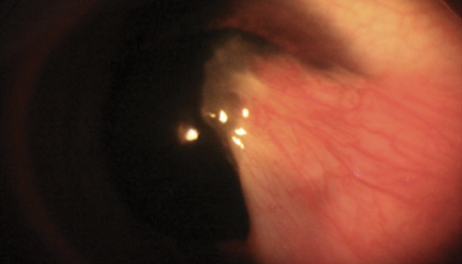 |
| This new method of sustained drug delivery could help fight CNV in patients with various ocular conditions. Photo: Megan Mannen, OD. Click image to enlarge. |
A vision-threatening component of many ocular diseases including those in the cornea, macula and diabetes-related eye conditions is angiogenesis, which is typically treated via intravitreal injections of anti-VEGF, such as bevacizumab. Still, anti-VEGF therapy doesn’t come without its own complications such as damage to adjacent tissue, as well as the burden of the high frequency of treatment.
Earlier this week during the ARVO 2022 conference in Denver, a group of researchers from the University of Michigan and Purdue University presented a study on a novel therapy for angiogenesis that could potentially eliminate the possible negative effects of anti-VEGF injections, at least for anterior segment use. The long-term treatment involves the use of biodegradable silicon nanoneedles containing bevacizumab that are fabricated on a tear-soluble contact lens that dissolves in under a minute.
The study evaluated the performance of the sustained drug delivery lenses in a cohort of 24 rabbits with corneal neovascularization (CNV). To induce the condition in the animals, a suture was placed on the cornea to allow for CNV development. Then, the lens containing the silicon nanoneedles with bevacizumab was placed on the cornea and monitored by OCT, color photography and red-free imaging. The rabbits were followed for up to one month post-treatment to determine the outcomes.
The researchers reported that after just one week, CNV had significantly reduced, and improvements persisted through the one-month follow-up. In addition, the control rabbits in the study experienced no CNV reduction.
The nanoneedles also didn’t cause any of the potential adverse effects associated with traditional anti-VEGF injections. “They did not cause cytotoxicity,” the researchers noted in their ARVO abstract. “Histological images showed normal corneal morphology without evidence of cell death or damage to the corneal endothelium cells, corneal thickness and limbal stem cells.”
Applications for posterior segment drug delivery via this method were not included in this study; achieving drug penetration sufficient to rival that of intravitreal injection would be a high bar to clear.
Nevertheless, this research highlights the exciting development of a drug delivery vehicle for anterior segment ocular angiogenesis that, so far, appears to not only effectively treat the condition but also may reduce the burden of treatment on patients.
Original abstract content © Association for Research in Vision and Ophthalmology 2022.
Paulus Y, Park W, Nguyen VP, Lee CH. Biodegradable silicon nanoneedles for sustained treatment of angiogenesis. ARVO 2022 annual meeting. |

